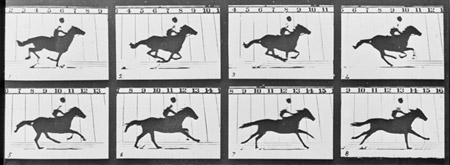Flying horses to Avatar - Eadweard Muybridge comes home to Kingston
Posted Tuesday 19 October 2010
Kingston University and Kingston Museum have teamed up to run a major programme of events and activities promoting Eadweard Muybridge. This coincides with the first significant retrospective of the famous photographer's work arriving at Tate Britain from the Corcoran Gallery, Washington DC.
David Falkner, Director of the University's Stanley Picker Gallery, believes that, in 2010, Muybridge's work is more relevant than ever. In this interview he explains how Muybridge's experiments have direct links to modern films such as Avatar, Alice in Wonderland and The Matrix.
Muybridge, the Victorian, Kingston-born photographer, is perhaps most famous for his sequence of horse photographs, which proved that all four of the animal's legs leave the ground while it is cantering.
When he died in 1904, Muybridge bequeathed his personal collection of equipment and material to Kingston Museum, which from 18 September to 12 February is staging its own exhibition, 'Muybridge Revolutions', featuring work not included in the Tate show. The exhibition focuses on Muybridge's experiments with the Zoöpraxiscope, described as the "missing link between slide projection and cinema".
During the same period, Kingston University's Stanley Picker Gallery is showing two contemporary commissions by artists Trevor Appleson and Becky Beasley who have been exploring Muybridge's archives and reflecting on his legacy.
The local community too are being encouraged to learn more about Kingston's famous son with - amongst other activities - children getting involved in Victorian beard-making workshops and a photography competition with an accompanying exhibition being staged at John Lewis.
Contact us
General enquiries:
Journalists only:
- Communications team
Tel: +44 (0)20 8417 3034
Email us



